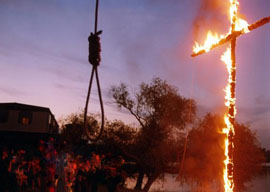
October 31, 2010

I”ll stereotype merely from the announcers’ and callers’ voices”the males ranged from tenor up to soprano, and the females spanned a sonic rainbow from combat-gear lesbian to society-matron pompous”and I’ll conclude that NPR’s producers and listeners likely have extremely little in common with Islamic terrorists. I”ll also venture that they probably fear Muslims”especially when it comes to offending them”far more than Juan Williams does, although I doubt they’d be brave enough to admit it.
Williams made his living as a commentator, yet he was fired for what appeared to be sincere comments. The fact that he sandwiched these comments between a prefatory “I’m not a bigot” and a subsequent discourse on how all stereotyping is wrong did not save him. Even the fact that he’s black didn’t help, because Muslims”the biggest and most obvious enemies Americans currently have”are apparently now more precious in America than blacks are.
So why was he fired? Because he made the fatal mistake of saying something that nearly everyone seems to feel but that everyone knows you’re not allowed to say.
His firing comes on the heels of two other high-profile terminations of reporters for making excommunicable gaffes: 1) CNN’s Rick Sanchez for suggesting that Jews were overrepresented in his own network’s upper echelons; and 2) longtime White House correspondent Helen Thomas for stating that Israel is not the ancestral homeland of most modern Jews.
As a Hispanic, Rick Sanchez belongs to a demographic that outnumbers blacks but is severely underrepresented in American media and popular culture. Although CNN judged his comments deserving of professional murder, I don”t recall them bothering to provide any evidence that would soundly refute his allegation that Jews aren”t a “persecuted minority” at CNN nor, for that matter, anywhere else in the mainstream media. Since Jews are around two percent of the population, let’s just say that any Jewish media ownership exceeding two percent would constitute a possibly unfair overrepresentation, and let’s just leave it at that.
In the comments that got her canned, Helen Thomas implied that many Jews currently inhabiting Israel have no genetic ties to the ancient Hebrews. At least to the naked eye, the Ashkenazi Jews who dominate modern Israel appear to be Eastern European rather than swarthy and “Semitic.” In his 1976 book The Thirteenth Tribe, British Jew Arthur Koestler argued as much”that the Ashkenazim were descendants of the Khazars, an ancient Turkic tribe that flourished from the 7th to 10th centuries and whose tribesmen have no genetic ties to ancient Israel. I”ve since heard that the Khazar theory has been “discredited” and “debunked,” but as is usually the case when I hear those terms, I don”t hear much actual discrediting or debunking. Yet merely daring to agree with the theory in public ended the career of a woman who”d worked at UPI for 57 years.
It’s probably fair to say that many journalists disagree with Williams, Sanchez, and Thomas. It’s also possible that perhaps an equal or greater number agree with them but would never admit it because it’s career suicide.
In a sane society, reporters would be fired for not speaking their minds when they felt that lives were at stake. They”d be excoriated for not investigating whether “dangerous” ideas are potentially true. The truth would set them free from ignorance, not get them ejected from the newsroom.
But we don”t live in a sane society. Ours is a sick and frightened culture too terrified to say the things we”re not supposed to say, too craven to even consider believing the things we”ve been forbidden to believe.
The next time you hear that a reporter got fired for doing nothing more than making a comment, look carefully at what they said. It might be the closest thing to the truth you”ve heard all month.